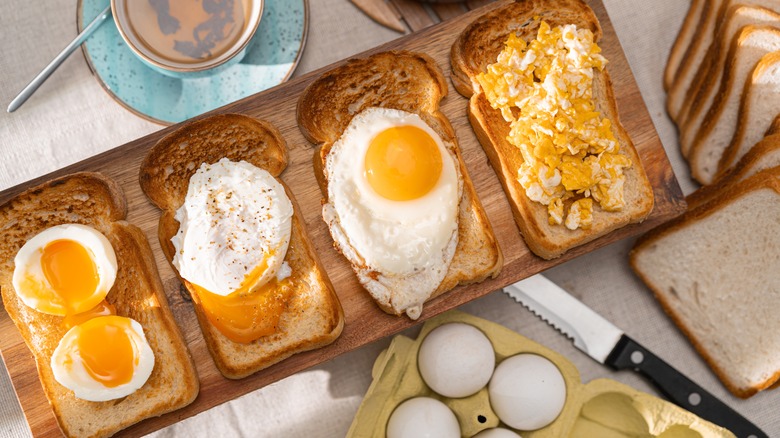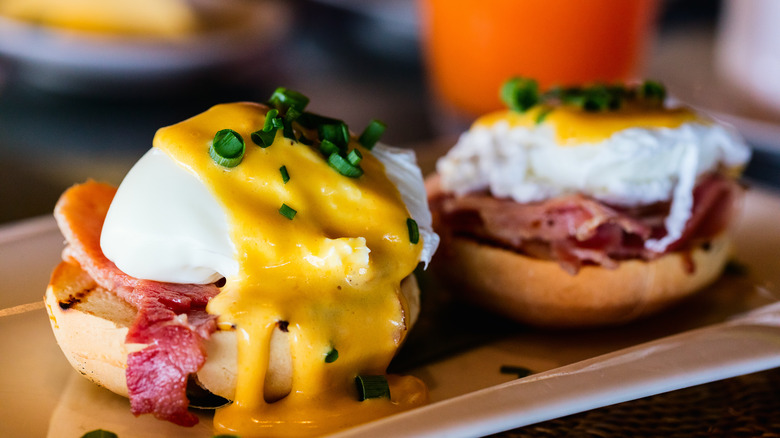How Eggs Came To Be The Hero Of Breakfast
It's difficult to imagine breakfast without eggs. Not only are there a seemingly infinite number of ways to prepare these hen-laid treasures – fried, poached, scrambled, sunny side up, hard-boiled, soft-boiled, and so on — there are also a rich variety of egg-based dishes whose popularity is inextricably bound with the morning meal. The omelet is a breakfast star, for instance, and frittatas and quiche are also popular options for this meal, as well as its hybrid off-shoot: brunch.
It wasn't always this way, however. In fact, for much of the history of Western civilization, breakfast simply didn't exist. Some give the Ancient Romans credit for inventing breakfast and serving eggs along with it, but this practice would have been rare, and decidedly not recommended. Most Ancient Romans, it turns out, consumed but one meal a day. Yes, you heard that right. One Meal a Day (OMAD) diets and intermittent fasting weren't invented in the 21st century. The Ancient Romans' were doing it thousands of years ago. Their daily meal was usually served at noon, per BBC News.
Even in the Middle Ages, when farmers were rising at the crack of dawn to tend their crops, breakfast still wasn't commonly eaten. Instead, people had to wait until after church services to eat their first meal of the day. It was only during the 17th century that breakfast finally began to be commonly eaten, and yes, eggs were on breakfast tables from the very beginning.
The importance of eggs in breakfast history
It's thought that our human ancestors have been consuming eggs for about 6 million years, but for much of this time, it was a function of survival, not as part of any organized breakfast. China is the first country known to have domesticated hens for laying eggs, doing so as far back as 5,400 B.C., according to this NZ Life. The practice was adopted in Europe by the 7th century B.C., and in the Americas long before Columbus arrived — although he is sometimes given credit for introducing them.
Breakfast itself was a long-time coming, however. Thomas Aquinas, a religious scholar of the 13th century who was later canonized as a saint, famously equated morning meals with gluttony, per The Atlantic. The Ancient Romans had felt the same way. Breakfast was akin to gluttony. It wasn't until 1620 that someone advanced the revolutionary proposition that eating eggs for breakfast might actually be healthy. That was Tobias Venner, an English physician who recommended eating them poached, according to Bon Appétite. Perhaps not coincidentally, breakfast was finally introduced on a wide scale at about that time.
So eggs were actually the hero of breakfast from the very beginning — at least in England — and in fact helped to establish it there as a morning ritual. One of the first English cookbooks, published in 1669, recommended eating two eggs each morning. Poached or scrambled were the preferred egg preparation methods for these early 17th-century English breakfasts.
The evolution of breakfast in America
It took a while for eggs to become a breakfast standard in America. During the Colonial era, for instance, the morning meal was largely dominated by cornmeal style staples like corn pone and Johnnycakes. The latter, in fact, was a favorite of American inventor and Declaration of Independence signer Benjamin Franklin, according to The New York Times.
Breakfast menus became diversified during the latter half of the 19th century, and began to more commonly include ingredients like eggs. Eggs Benedict, for example — now beloved as both a breakfast and brunch staple — was created during this period. Although its origin story is disputed, most agree that the pairing of Hollandaise drizzled poached eggs, Canadian bacon, and an English muffin was invented in New York City. Some place its birth at the famed Delmonico's Restaurant in the 1860s, while others claim it occurred at the Waldorf Hotel during the 1890s.
Eggs and bacon, now a long-established breakfast partnership, didn't become American classics until the 1920s, and then only with the assistance of public relations pioneer Edward Bernays, who was hired to sell bacon on behalf of the Beech-Nut Packing Company. A native Austrian whose uncle just happened to be Sigmund Freud, Bernays knew a thing or two about psychology. He asked 5,000 doctors to affirm that eating a heartier breakfast like bacon and eggs was healthier, noted the University of Pennsylvania. Bernays then publicized the positive results, and bacon and eggs have been on American breakfast tables ever since.



